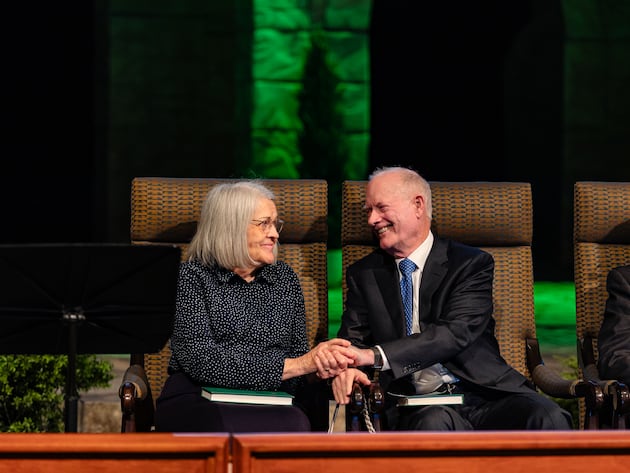November 10, 2025, 5:35 PM MST
On Tuesday, October 28, General Authority Seventy Emeritus Elder Kim B. Clark proclaimed to Ensign College students, “It is a wonderful season in the Lord’s work.”
Elder Clark said today’s increasing influx of new technologies is allowing learning and teaching to flourish. “On this very day, Ensign College will offer thousands of students around the world exceptional courses and programs that were previously inaccessible.”
Elder Clark, who served as Church Education Commissioner from 2015 to 2019, assured students that the Lord is working “in power in the Church” to help them receive the education He wants them to have.
But that education, he explained, requires deep learning of the whole soul: mind, spirit, body and spirit. New technologies such as artificial intelligence have the power to greatly enhance deep learning, but they also bring unique challenges and risks.
“Although AI has the potential to greatly benefit our pursuit of deep learning, it also poses serious traps, pitfalls, and challenges,” Elder Clark said. “Reaping the benefits and avoiding the traps will depend on the relationship we build with AI tools.”
Addressing students gathered in the Conference Center Theater in downtown Salt Lake City, Elder Clark outlined the risks and dangers and opportunities associated with its use as they apply specifically to student education and deep learning.
Deep learning elements
Elder Clark described the four elements of deep learning: knowing, feeling, doing, and becoming. These apply to all kinds of knowledge, he said, from the spiritual topic of repentance to the earthly study of accounting.
“Knowing” means reading books, studying, and knowing the principles. For example, in accounting, you need to know concepts and rules about debits, credits, revenue, expenses, cash flow, profit, etc.
Some may wonder if there is anything to “feel” about accounting principles. “Now we have to focus on the purpose of accounting, why accounting exists in the first place,” Elder Clark said. “Accounting is all about integrity, accountability, honesty, truth, and good information that helps people make better decisions.”
These are Christ-like qualities that individuals can feel in their hearts and, by applying the principles, will be motivated to “act,” or take effective and righteous action. Acting in accordance with these qualities, Elder Clark said, helps a person become more and more “like” Christ.
Just as the Liahona provided guidance and feedback to Lehi and his family in the wilderness, Elder Clark suggested that AI technology be used in the role of tutor and coach.
The system is designed to help you, as a tutor, assess your students’ progress through diagnostic quizzes and questions, and provide Q&A support focused on student learning, allowing you to provide personalized support tailored to each student’s learning experience.
As a coach, AI systems can provide personalized support as practice and learning occur in the flow of work.

Deep learning with AI tutor/coach
So how do AI tutors and AI coaches apply to elements of deep learning?
First, Elder Clark explained that interactions with AI tutors should be limited to the “knowing” element of deep learning. “And here again, AI tutoring has boundaries, allowing students to read books on their own, answer question sets and assignments, do exercises, and write essays.”
Second, your interactions with your AI coach should be limited to the “to-do” elements of deep learning. “The AI coach provides feedback and support, but only after the student takes action to put the concept into practice, demonstrates a skill, or meets established criteria in the work flow,” Elder Clark said.
These boundaries mean that AI can have limited involvement in the “feel” and “become” elements of deep learning.
“Students need to engage in (‘feeling’ and ‘becoming’) through prayer, repentance, contemplation, worship in the Lord’s house, and personal interaction with others, guided, inspired, and blessed by Jesus Christ through the Holy Spirit,” he said.

Elder Clark said it’s critical to treat AI as a tool, a “very big machine.”
Relying on AI for the “feel” and “become” elements risks making students look to the AI rather than Heavenly Father or Jesus Christ for spiritual guidance.
Elder Clark also said that giving in to the temptation to let AI do everything can lead to atrophy of spiritual abilities. Students may check off assignments or complete projects, “but they do not ‘set out their hearts to understand’ (Proverbs 2:2). They do not grow spiritually, they do not acquire Christlike qualities, they do not learn deeply.”
Impact of AI
He shared two implications for those looking to “deeply learn in the age of AI.”
First, deep learning always requires careful and intentional use of moral agency. Elder Clark pointed out that boundaries and restrictions can be easily circumvented.
“For the ends of justice, we must use systems based on principles of justice. We must understand what is at stake, choose to abide by boundaries and limits, and establish our own ‘no AI’ zones. Students must choose to use their agency and learn deeply,” he said.
Second, AI helps individuals realize the full potential of their talents and talents more quickly and effectively. “That’s potentially very cool,” Elder Clark said. “However, the availability of AI systems has significantly raised the spiritual stakes of that endeavor. Only by increasing our sensitivity to the promptings of the Spirit and increasing our spiritual capacity to receive revelation can we realize our potential.”
